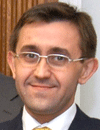08:00 | Conference Registration, Materials Pick-Up, Morning Coffee and Tea |
|
Session Title: Conference Opening Session -- Flow Chemistry Asia 2022 |
| |
09:00 |  | Conference Chair Continuous Flow Drug Manufacturing in Africa
Paul Watts, Distinguished Professor and Research Chair, Nelson Mandela University, South Africa
While Africa has a variety of companies that formulate medicines it has very little active pharmaceutical ingredient (API) manufacturing, with the consequence that these need to be imported. This results in increased drug costs, making medications unaffordable to most patients in Africa. Economic, social and political stresses have been witnessed all over the world during the COVID-19 pandemic. In particular, drug shortages and inaccessibility is one of the many results of disruption of supply chains due to the shutdown of manufacturing activity, as well as export restrictions and bans by other countries. To this effect, we are working on developing local drug manufacturing capacity in Africa using continuous flow technology, with the goal of lowering the cost of drugs, improving drug accessibility and ultimately improving Africa’s health. A selection of examples will be presented. |
|
09:30 |  | Keynote Presentation Intensification and Electrification of Flow Chemistry
Thomas Wirth, Professor, Cardiff University, United Kingdom
The advantages of increased mixing of biphasic reaction mixtures in flow offers great potential compared to conventional flask techniques, especially when combined with microwave irradiation or phase transfer catalysis. The presentation will also illustrate that metal-catalyzed reactions and enzyme-promoted transformations can be performed advantageously in biphasic systems. The development of a microreactor for electrochemistry including several applications will be discussed. |
|
10:00 |  CSTR Series: Where Usual Chemistry Does Not Flow CSTR Series: Where Usual Chemistry Does Not Flow
Nikolay Cherkasov, Managing Director, Stoli Chem
Conventional flow reactors such as tubes and chips are excellent. Their scaling up, however, is difficult because fluid velocity determines residence time, pressure drop, and mixing/heat transfer. CSTRs, on the other hand, provide mixing independent of flow rates and could handle exothermic, multiphase, and reactions with solids. We discuss case studies where such capabilities improve process throughput and yield.
|
10:30 | Mid-Morning Coffee, Tea and Networking in the Exhibit Hall |
11:00 |  How Flow Chemistry Can Impact the Early Drug Discovery Process? How Flow Chemistry Can Impact the Early Drug Discovery Process?
Andrew Mansfield, Flow Chemistry Leader, Syrris
Flow chemistry is a growing technology in the pharma industry, where it has proved itself invaluable, especially in the process development phase of drug discovery. However, the hit-to-lead and lead-generation phases have been slower to embrace these techniques. The potential benefits are huge, particularly for rapid library generation and challenging chemistries that were previously hard to achieve by traditional batch methods. The content of this presentation looks at how researchers in early drug discovery, who are looking for practical and efficient ways to increase their productivity and shorten the hit-to-lead times can achieve this through the use of flow chemistry techniques.
|
11:30 |  Triplex Plunger-driven Diaphragm Pumps Triplex Plunger-driven Diaphragm Pumps
Taro Yanagiuchi, Sales Manager, Fuji-Techno
We will be presenting two new offers to our portfolio. 1st our newly developed diaphragm pump, which unlike others, can handle a vast majority of slurry liquids. 2nd our AI software which further minimizes pulsation thru AI learning of the pulsation patterns and adjusting the motor speed. In the introduction, we will explain the operating principles, performance, benefits of our innovative products.
|
12:00 | Networking Lunch in the Exhibit Hall -- Visit Exhibitors and View Posters -- Japanese Bento Box Lunch |
|
Session Title: Flow Chemistry Asia 2022 -- Emerging Trends in Flow Chemistry Session |
| |
14:00 | Micro-Flow Synthesis of Specialty Peptides
Shinichiro Fuse, Professor, Nagoya University, Japan
Amide bond formation via generation of highly electrophilic species was developed. Undesired reactions were successfully suppressed by using micro-flow technologies. The developed approach was used for synthesis of specialty peptides. |
14:30 | Incorporative Mixing in Microreactors: Influence on Reactions and Importance of Inlet Designation
Shusaku Asano, Assistant Professor, Kyushu University, Japan
We studied the mixing in a microreactor
considering fluid division and incorporation. Incorporative
mixing occurs when a divided feed stream is taken into another stream. Reaction
selectivity is sensitive to incorporative mixing. Thus, the change in the feed
orientation of inlets significantly changes the reaction outcome. |
15:00 | Flow Chemistry and Reaction Engineering - Application to the Synthesis of Neuroprotective Agents
Darren Riley , Associate Professor, University of Pretoria , South Africa
The presentation will focus on the development of end-to-end flow-based synthetic routes to pharmaceuticals with a neurological focus and will include aspects of batch-flow hybridization and reaction engineering. Insight will also be given pertaining to the use of flow technology as a disruptive leap-frogging technology for the localization of pharmaceutical manufacturing in developing countries. |
15:30 | Mid-Afternoon Coffee and Tea Break and Networking in the Exhibit Hall |
16:00 | Flow-based Process Development to Support the Localization of Active Pharmaceutical Ingredient Manufacturing in Africa
Jenny-Lee Panayides, Principal Scientist and Research Group Leader, CSIR Biosciences South Africa, South Africa
The presentation will focus on the efforts to adopt flow technology in developing countries for the manufacture of active pharmaceutical ingredients. Case studies will highlight the development of a flow-based route to a non-steroidal anti-inflammatory drug and discuss recent efforts to develop an economical platform for controlling and automating flow equipment. |
16:30 |  | Keynote Presentation Novel Microfluidic Platforms for Scale-Up Production and Autonomous Self-Optimization
Dong Pyo Kim, Yonsan Chaired Professor, Pohang University of Science And Technology (POSTECH), Korea South
Flow chemistry in the confined microfluidic space enables easy up-scaling production at precise controlled conditions. In the talk, we show the assembly of 16 numbering-up 3D printed metal microreactor to render high productivity up to 20 g for 10 min operation of subsecond ultrafast chemistry. And, hexagon-shaped 3D printed polymer module of photomicroreactor with solar concentrator leaded to facile assembly into serial and radial reconfiguration for high throughput of synthesis. In addition, for scalable production of emulsions, compact 3D printed droplet generator was devised by array of 40 drop-makers with a 3D void geometry and a flow distributor, producing microgels and microparticles. Finally, we explore ultrafast flow chemistry by autonomous self-optimizing platform that accelerates the optimization and screening of complex chemistry. |
|
17:00 |  | Keynote Presentation Organic Synthesis Enabled by Catalytic Flow Methods
Shu Kobayashi, Professor, The University of Tokyo, Japan
In synthesis, flow methods have several advantages over batch methods in terms of environmental compatibility, efficiency, and safety. Wastes derived from work-up processes can be minimized or omitted altogether by performing organic transformations in flow. Equipment for chemical manufacturing can be designed to be smaller, which would enable significant savings in space and costs. In addition, the differences between batch and flow reactors, which are the large surface to volume ratios and the rapid mixing/quenching of reagents, should make chemical productions safer and more efficient. While continuous-flow practices have been adopted in the petrochemical and bulk chemical industries, its applications in fine chemical production have been limited. It was believed that synthesis by flow methods could be applicable for the production of simple gasses such as ammonia, but was difficult to apply to the preparation of complex molecules such as active pharmaceutical ingredients (APIs). This lecture will discuss recent advances in organic synthesis enabled by continuous-flow methods. In particular, the development of heterogeneous catalysts in multi-step continuous-flow reactions (sequential flow reactions) for the synthesis of complex organic molecules will be highlighted. |
|
18:00 | Japanese Beer and Sake Reception in the Exhibit Hall -- Network with Colleagues and Engage with Exhibitors and Poster Presenters |
19:00 | Close of Day 1 of the Conference |








